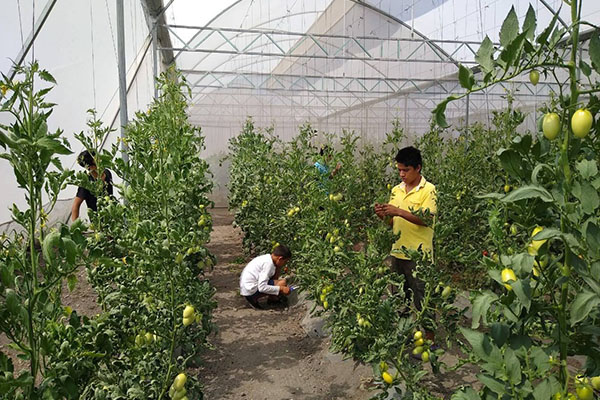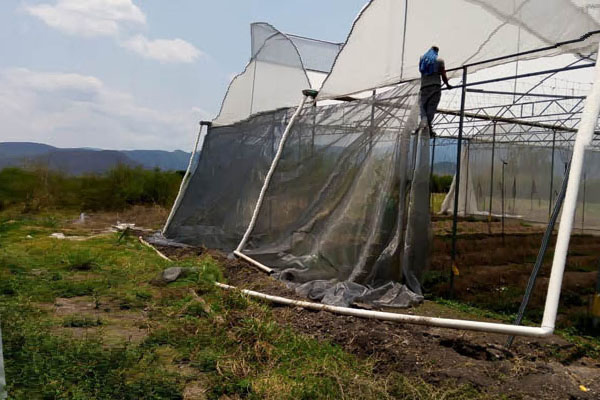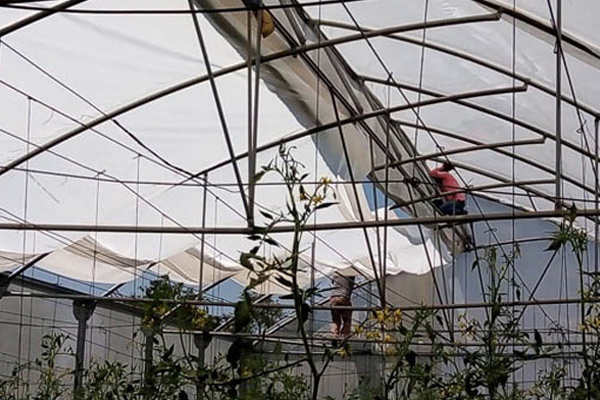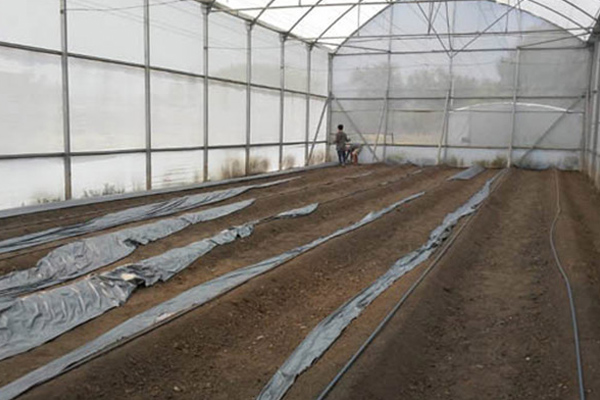NPH Mexico: Food Production Recovers from Storm Damage
A storm in 2020 reduced the tomato and cucumber crops at Casa San Salvador, causing a food shortage during the COVID-19 pandemic. However, NPH Mexico is taking steps to recover from the setback.
 Daniel Zapata
Daniel Zapata
Communications Officer, NPH Mexico
June 14, 2021
…
Kids need nutritious food to develop healthily. The NPH Mexico home in Miacatlán, Morelos, has found a cost-effective way to provide a healthy diet for its children and adolescents by growing vegetables in its greenhouses. Unfortunately, storm damage to the greenhouses created a new set of challenges in 2020.
The Casa San Salvador campus has served as the main facility for the NPH Mexico family since 1970. This site has grown to include schools, a clinic, a chapel, and various support facilities, plus a farm with chickens, sheep, pigs, as well as fruits and vegetables. Around 430 children live, play, and study at the bustling Casa San Salvador campus, located in the village of Miacatlán, 77 miles south of Mexico City.
Miacatlán is located in Morelos, one of the poorest Mexican states. According to the National Council for the Evaluation of Social Development Policies (CONEVAL), around 50.4% of Morelos’ residents live in poverty, with 7.4% in extreme poverty. Ironically, Morelos is well-known for its agriculture. Casa San Salvador is on fertile land with a rich history, once being the site of a sugar plantation owned by Spanish conquistador Hernán Cortés.
TOMATOES AND CUCUMBERS CROPS
Tomatoes and cucumbers, the main crops grown in the Casa San Salvador greenhouses, are high in vitamins and minerals, providing many health benefits. Tomatoes were domesticated in Mesoamerica, so they are a primary ingredient in Mexico’s rich culinary culture, used in an infinity of traditional dishes. Cucumbers are enjoyed in salads and other healthy foods. The farm also grows other vegetables, like cabbage, chard, and squash, that further enrich the meals provided at Casa San Salvador.
These two vegetables are key sources of vitamins and minerals for the children of NPH Mexico since around 40% of the youths who enter the NPH homes in Mexico are malnourished. As head pediatrician Doctor Michell Pérez explains, “Upon entering NPH, as part of our medical protocol, all children undergo an assessment of their nutritional status through a medical and nutritional consultation called “Niño Sano” – Healthy Child – from which we determine that most of the children come in a malnourished state, with their weight and height being below the range for their age. Malnutrition is reflected in the fact that children do not perform as expected for their age”.
Therefore, providing locally grown tomatoes and cucumbers for our children and youths plays an important role in helping to improve their diet and health.
VEGETABLES GROW, BUT SO DO PROBLEMS
2020 was a challenging year for NPH Mexico, not only because of the COVID-19 pandemic but also due to damage from a severe storm that lowered the amount of food produced for the youths at Casa San Salvador.
In April, a strong thunderstorm with hail hit Miacatlán, knocking down trees onto NPH’s gardens and damaging two of its three greenhouses, reducing the farm’s food output. The greenhouses’ netting and structure were damaged, as well as the perimeter net, allowing pests to enter.
The whiteflies that infested the tomato plants introduced the tobacco mosaic virus. This virus lowered the tomato harvest since it shortens the plant’s life-cycle and limits optimal fruit growth.
The damage to the greenhouses also impacted the cucumber crops, the second most important crop. It caused a lot of water to enter the greenhouses, leading to an outbreak of the Midiu fungus that greatly reduced the 2020 cucumber harvest.
HARVESTING SUPPORT AND OPPORTUNITIES
Thanks to the support from sponsors and donors, NPH Mexico was able to obtain the necessary materials to fix the storm damage and begin to restore production. The greenhouses’ structures were repaired and new netting was installed, while fungicides and agrochemicals eliminated the fungi and controlled the pests.
The total production of tomatoes in 2020 was 16,591 kilograms (36,576.89 pounds), valued at $17,420.60 US ($1.05 per kg on average). Even though they produced a large amount of crops, the tomato harvest failed to meet the needs of the kitchens in Miacatlán and Cuernavaca, requiring purchases to make up for this deficit. Increased food prices in 2020 meant this was a costly loss for NPH.
In terms of cucumbers, annual production in 2020 was 6,320 kg (13,934 lbs.). This was actually a shortage of 7,179.50 kg (15,828.08 lbs.) since the goal had been to produce 13,500 kg (29,762.40 lbs.). The damage from the storm, plus the fungi and pests, led to a 46% deficit in the 2020 cucumber crop, a loss of $8,220.53.
Greenhouses are a sustainable and viable investment for NPH. The annual cost of food production (with two harvest cycles) is $15,862, plus a maintenance cost of $4,395, adding up to $20,257 per year. If NPH Mexico had to buy the tomatoes and cucumbers needed annually for its homes, it would cost around $31,000. Instead, NPH Mexico saves over $10,000 a year by growing its own vegetables, an approximate savings of 35%, money that can serve other purposes.
NPH Mexico still needs support to continue maintaining the greenhouses and to buy supplies necessary for increasing vegetable production, so that in 2021 harvests can be restored to earlier levels and even surpass them.
Photo above: Tomato plants in the greenhouse. Photos below: Repairing greenhouse structure and preparing soil for a growing cycle.
Related Information
• NPH Mexico
• NPH Sustainability Program
• How Your Help Makes an Impact at NPH














